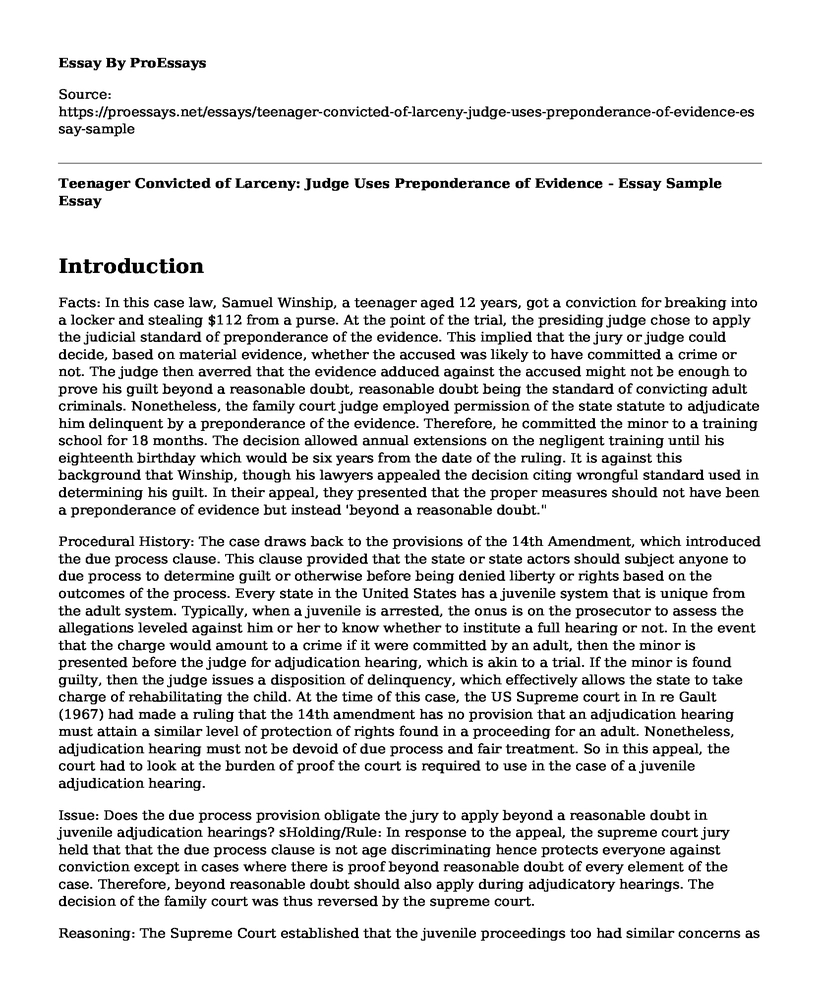Introduction
Facts: In this case law, Samuel Winship, a teenager aged 12 years, got a conviction for breaking into a locker and stealing $112 from a purse. At the point of the trial, the presiding judge chose to apply the judicial standard of preponderance of the evidence. This implied that the jury or judge could decide, based on material evidence, whether the accused was likely to have committed a crime or not. The judge then averred that the evidence adduced against the accused might not be enough to prove his guilt beyond a reasonable doubt, reasonable doubt being the standard of convicting adult criminals. Nonetheless, the family court judge employed permission of the state statute to adjudicate him delinquent by a preponderance of the evidence. Therefore, he committed the minor to a training school for 18 months. The decision allowed annual extensions on the negligent training until his eighteenth birthday which would be six years from the date of the ruling. It is against this background that Winship, though his lawyers appealed the decision citing wrongful standard used in determining his guilt. In their appeal, they presented that the proper measures should not have been a preponderance of evidence but instead 'beyond a reasonable doubt."
Procedural History: The case draws back to the provisions of the 14th Amendment, which introduced the due process clause. This clause provided that the state or state actors should subject anyone to due process to determine guilt or otherwise before being denied liberty or rights based on the outcomes of the process. Every state in the United States has a juvenile system that is unique from the adult system. Typically, when a juvenile is arrested, the onus is on the prosecutor to assess the allegations leveled against him or her to know whether to institute a full hearing or not. In the event that the charge would amount to a crime if it were committed by an adult, then the minor is presented before the judge for adjudication hearing, which is akin to a trial. If the minor is found guilty, then the judge issues a disposition of delinquency, which effectively allows the state to take charge of rehabilitating the child. At the time of this case, the US Supreme court in In re Gault (1967) had made a ruling that the 14th amendment has no provision that an adjudication hearing must attain a similar level of protection of rights found in a proceeding for an adult. Nonetheless, adjudication hearing must not be devoid of due process and fair treatment. So in this appeal, the court had to look at the burden of proof the court is required to use in the case of a juvenile adjudication hearing.
Issue: Does the due process provision obligate the jury to apply beyond a reasonable doubt in juvenile adjudication hearings? sHolding/Rule: In response to the appeal, the supreme court jury held that that the due process clause is not age discriminating hence protects everyone against conviction except in cases where there is proof beyond reasonable doubt of every element of the case. Therefore, beyond reasonable doubt should also apply during adjudicatory hearings. The decision of the family court was thus reversed by the supreme court.
Reasoning: The Supreme Court established that the juvenile proceedings too had similar concerns as those in criminal matters which had informed the crafting of "beyond a reasonable doubt" as a standard in due process. The jury averred that the relevance of beyond reasonable doubt in determining guilt in juvenile adjudication is even more in cases where the charge would be criminal and attract a longer jail term were it committed by an adult. The Supreme Court effectively quashed the argument of the respondents that juvenile adjudications did not constitute convictions and had no effects on the rights of the child. Furthermore, the court found that the juvenile justice system is ostensibly intended for rehabilitation but that notwithstanding, none of these substantive rehabilitation benefits provided in the juvenile process would be compromised if a higher standard of proof is adopted.
Cite this page
Teenager Convicted of Larceny: Judge Uses Preponderance of Evidence - Essay Sample. (2023, Feb 27). Retrieved from https://proessays.net/essays/teenager-convicted-of-larceny-judge-uses-preponderance-of-evidence-essay-sample
If you are the original author of this essay and no longer wish to have it published on the ProEssays website, please click below to request its removal:
- Essay Sample on International Law and Human Rights
- Essay Sample on The Well-Being of Women and Girls
- Sexual Harassment at Work: 8/10 Women Affected - Essay Sample
- Unlocking Secrets: Detecting Latent Prints With Lumination and Fluids - Essay Sample
- Essay Example on Law Enforcement: Fighting Crime with Lethal & Nonlethal Weapons
- Free Report Example on Over Dependence on Internet
- Developing employability skills - personal profile and self-evaluation







